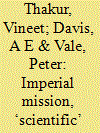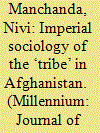| Srl | Item |
| 1 |
ID:
155161


|
|
|
|
|
| Summary/Abstract |
This article offers an alternative account of the origins of academic IR to the conventional Aberystwyth-centred one. Informed by a close reading of the archive, our narrative proposes that the ideas and method of what was to become IR were first developed in South Africa. Here, we suggest how the creation of a racially-ordered state served as a template for the British Commonwealth and later the World State. We draw further on the British dominions’ tour of Lionel Curtis, founder of the Royal Institute of International Affairs (RIIA), between September 1909 and March 1911, to indicate how Edwardian anxieties about the future of empire fuelled the missionary zeal of imperial enthusiasts, who placed enormous trust in the ‘scientific method’ to create a unified empire. This method and the same ideas were to become central features of the new discipline of IR. By highlighting the transnational circulation of these ideas, we also provide an alternative to the nationally-limited revisionist accounts.
|
|
|
|
|
|
|
|
|
|
|
|
|
|
|
|
| 2 |
ID:
157593


|
|
|
|
|
| Summary/Abstract |
The ‘tribe’ is a notion intimately related to the study of Afghanistan, used as a generic signifier for all things Afghan, it is through this notion that the co-constitution of coloniser and colonised is crystallised and foregrounded in Afghanistan. By tracing the way in which the term ‘tribe’ has been deployed in the Afghan context, the article performs two kinds of intellectual labour. First, by following the evolution of a concept from its use in the early 19th century to the literature on Afghanistan in the 21st century, wherein the ‘tribes’ seem to have acquired a newfound importance, it undertakes a genealogy or intellectual history of the term. The Afghan ‘tribes’ as an object of study, follow an interesting trajectory: initially likened to Scottish clans, they were soon seen as brave and loyal men but fundamentally different from their British interlocutors, to a ‘problem’ that needed to be managed and finally, as indispensable to a long-term ‘Afghan strategy’. And second, it endeavours to describe how that intellectual history is intimately connected to the exigencies of imperialism and the colonial politics of knowledge production.
|
|
|
|
|
|
|
|
|
|
|
|
|
|
|
|